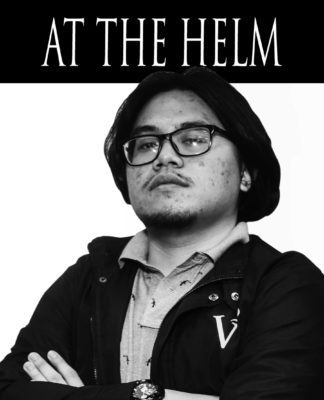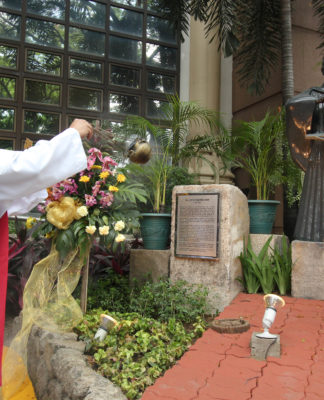POLLUTION, allergies, cancers, and board exam leaks are but some of the issues faced, analyzed, and discussed by budding Thomasian researchers in their own group or individual undergraduate theses. Here’s Varsitarian’s rundown of the more notable theses from the natural and health sciences of Batch 2008.
Chemical Engineering: Bitaog as Bio-diesel
Aiming for the alleviation of both economic and environmental global problems such as oil price increase and climate change, Juan Paulo Antonio, Alden Ferdinand Fabros and April Shower Mendiola, coached by their thesis adviser Maria Natalia Dimaano, examined Bitaog, a non-edible but locally available agricultural crop, as a viable substitute for diesel fuel through their thesis titled, “Extraction, Transesterification and Characterization of Calophyllum inophyllum (Bitaog) Seed Oil as Potential Source of Biofuel.”
According to Antonio, seed oil from Bitaog can help lessen green house gas emissions and lower demands for conventional diesel fuel because of its ability to counteract the carbon dioxide emission in vehicles.
Antonio says that the non-edible property of Bitaog gives it a unique advantage because of its abundance in resources, unlike other plants used as biofuels such as corn and coconut, which are also utilized for food and other needs.
They first performed transesterification, a process that could isolate potential biofuel components. The researchers determined the substances present by Gas Chromatography- Mass Spectrometry, a method for environmental analysis and specific identification of particular substances in a given sample. Two main fatty acid components of the oil were determined which provides Bitaog’s potentiality as a biofuel—Oleic Acid and Linoleic Acid.
Further fuel characterization and gas emission analysis of Bitaog Methyl Ester was done to compar
e its viability with conventional bio-diesels such as cocomethyl ester, also known as cocodiesel, to prove its effectiveness as a potential alternative.
Antonio, through his thesis, bagged this year’s third place in the 2008 Bank of the Philippine Islands (BPI) – Department of Science and Technology (DOST) Awards—an award given to three outstanding scientific theses of graduating students from different colleges and universities in the Philippines.
Biology: Blotting allergens in seconds
According to Timothy Tang Lee Say, existing methods of determining allergens, substances that can induce hypersensitivity reactions to a person’s immune system, which includes pricking the skin with an allergen and eliciting a reaction, are expensive, time-consuming, invasive, and are not entirely applicable for Filipinos.
“Each distinct geographical location have different sensitization profiles, that’s why allergy kit (from) abroad may not be compatible with those of the Philippines,” he said.
Together with Allen Yentyl Dalmacion, Peamy Vanezza Dayag, Vannie Rose Manapat, Emmanuel Angelo Nerit, and their thesis adviser John Donnie Ramos, Tang Lee Say, worked on “?-Blot: A Simple and Rapid Immunodiagnostic Kit for House Dust Mite and Cockroach Allergy.”
In their study, the researchers developed a simple kit designed to serologically diagnose house dust mite and cockroach allergies. They prepared aqueous extracts from three house dust mite species, Dermatophagoides farinae, Dermatophagoides pteronyssimus, and Blomia tropicalis, and three cockroach species Periplanetaamericana, Blatta orientalis, and Blatella germanica and quantified the protein contents of the extracts was done to determine the quality of the allergen extracts.
The researchers used Indirect IgE Enzyme Linked Immunosorbent Assay (ELISA)—a biochemical technique used to detect the formation of immune complexes, interaction of antigen and antibodies in a sample, to evaluate allergen-specific levels in allergic and non-allergic controls. The study’s sensitivity and specificity were then compared with the test’s reference method, the IgE ELISA.
The study of Tang Lee Say and his co-researchers won best thesis poster in the Department of Biology of the College of Science and served as an official entry of UST to the BPI-DOST Awards.
Nursing: How UST upheld truth in the 2006 board scandal
A study by several Nursing graduates — Alpha Khristine Jacob, Wilfred Guilaran II, Deanna Guillen, Ma. Jennifer Gumba, Ana Rica Gutierrez, Elaine Marie Gutierrez, Marlene Hatol, Marc Angelo Hizon, Ray Anthony Lester Ibañez, Julie Anne Inocencio, Jessica Amor Jabal, and Joey Ralph Jaramillo — tackled the leak-marred 2006 Nursing board exams.
“Decision Making Process of Batch 2006 Thomasian Nurses in Retaking the Philippine Nursing Licensure Examination” in particular sought to determine how several UST examinees decided to move for a retake of the exams against the more popular stand of the other examiners from other schools against it. (The UST College of Nursing through its faculty association had called for a retake of the exam. It was later vindicated when the government, confronted with the decision of a key American agency not to hire nurses who had passed the exam, ordered a retake.)
In its study, the group studied 17 Thomasian 2006 board passers and how they behaved according to Sophie’s Decision Making Theory (seeking outright purpose through honesty, integrity, and endurance), which describes the eight phases of how a person is able to reach a decision despite pressures and factors affecting self, profession and society.
According to the study, the UST examinees underwent the characterization phases: Discovering the dilemma, restless feeling, sinking-in of the effects of the problem, finding a way out, self-acceptance of the problem, discovering possibilities to settle the problem, standing firm, and restoring one’s self fully.
According to the study, Thomasian values played a part in the decision of the UST examinees to call for a retake of the exam.
Jacob, one of the researches, said the 2006 Nursing controversy inspired the Thomasian Nursing community to take a firm stand while maintaining objectivity and humility against severe criticism of the stand it took. “The decision-making process of the key informants showcased our Dominican stand for truth, justice, and integrity,” she told the Varsitarian.
Biochemistry: Tracking breast cancer cells
Titled “Preliminary Study on the Proliferating Effect of Crude Hyaluronic Acid Isolated from Human Placenta on Human Breast Carcinoma Cells,” Benjamin Joseph Ong, Amadeo Jose Atienza, Ma. Julie Ann Dueñas, Justine Melissa Dureza, Vanessa Lanot, Jayson Santiago, Juan Miguel Ilagan worked on the efficiency of hyaluronic acid, which can enhance cellular multiplication of breast carcinoma cells in vitro, a procedure done outside the human body.
In their study, the researchers isolated crude hyaluronic acid from the human placenta, determined the concentration of the isolate samples, and observed the proliferating effect by culturing the breast carcinoma cells.
Differentiation of cells with the intact membrane from those without an intact membrane was done to determine the viability of the cells cultured.
According to Ong, the results of their study suggested that hyaluronic acid from human placenta is efficient in multiplying proliferating breast carcinoma cells in vitro due to its favorable proliferating effect within the first 72 hours.
Ong said that the study highlights the importance of the placenta, an organ disposed after childbirth which was considered useless before.
Based on their study, the human placenta can play a very important role not only in cancer research but also in tissue engineering, immunotherapy, and in vitro drug testing. This can also benefit in vitro drug toxicity testing for patients undergoing chemotherapy as well as cancer researches involving in vitro studies.
“We enjoyed every step of our thesis; all the failures and success, we placed them close to our hearts. It was a very fulfilling experience since we were doing our thesis not only for the sake of just having it but to make it with the best of our abilities,” Tang Lee Say said.















